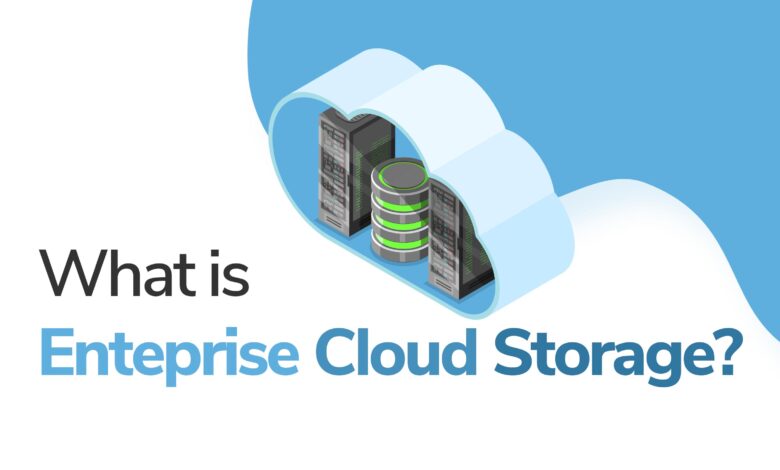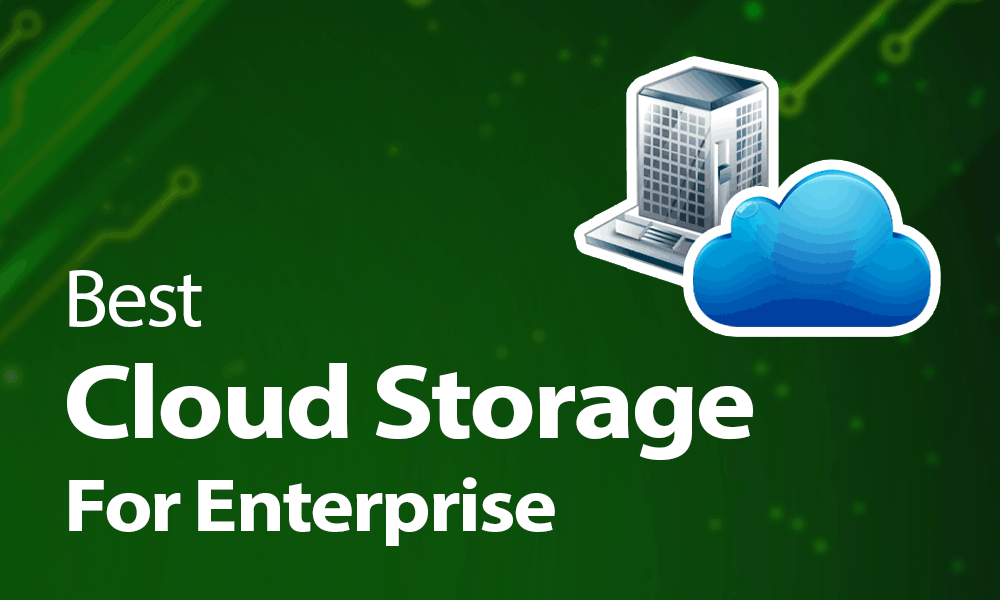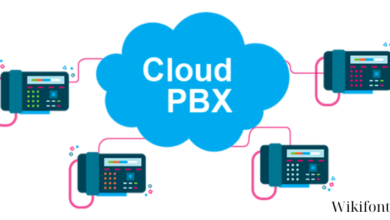What is Enterprise Cloud Storage? 4 Popular Types, Benefits and Challenges

Enterprise cloud storage’s broad use has the ability to profoundly alter how firms conduct their operations going forward. Businesses will depend more and more on cloud-based services as more firms shift their data and apps to the cloud, which will reduce the demand for on-premises IT infrastructure.
New business models and methods of operation, including totally remote or distributed teams, could result from this. Furthermore, the capacity to quickly access and exchange data from any location with an internet connection may promote greater productivity and cooperation as well as the creation of new, data-driven products and services. In the end, the widespread use of enterprise cloud storage may contribute to the development and expansion of the digital economy.
What is Enterprise Cloud Storage?
When a corporation uses cloud-based storage solutions to store, manage, and access its data, it is said to be utilizing enterprise cloud storage. These solutions often call for the use of distant servers that are hosted by a third-party provider and accessed via a secure network connection online.
Businesses can avoid the cost of pricey on-premises storage infrastructure by using cloud storage. They can quickly scale their storage capacity up or down as necessary thanks to it. Also, compared to conventional storage methods, enterprise cloud storage frequently provides improved data security, making it a preferred option for many businesses.
4 Types of Cloud Storage
Public, private, hybrid, and communal cloud storage are the four basic forms of cloud storage. Each of these varieties of cloud storage has distinctive features and advantages, and the best option for a given firm will rely on its individual needs and specifications. An overview of each of the four varieties of cloud storage is provided below:
- Public cloud storage: Using remote servers that are owned, run, and made accessible to the general public by a third-party provider constitutes public cloud storage. Since users simply pay for their actual storage needs and services, public cloud storage is often the most economical choice.
- Private cloud storage: Using distant servers that are owned and managed by a single company and not accessible to the general public is known as private cloud storage. Although it can cost more than public cloud storage, private cloud storage allows enterprises better protection and control over their data.
- Hybrid cloud storage: Hybrid cloud storage combines cloud-based storage services with on-premises storage infrastructure. This enables businesses to benefit from the advantages of both private and public cloud storage and can give them more flexibility and scalability.
- Community cloud storage: Community cloud storage entails the use of remote servers that are shared by several organizations with comparable needs and criteria. By enabling companies to split the cost of the underlying infrastructure, community cloud storage can give them access to the advantages of both public and private cloud storage.
How does Enterprise Cloud Storage work?
A third-party service provider offers cloud storage, which can be accessed online. The service provider runs and maintains a network of servers that are utilized to store the company’s data. When an employee needs to access company data, they connect to the service provider’s servers over the internet using a web-based interface or a dedicated client program.
To guarantee that the business’s data is constantly accessible and available, the service provider frequently employs a method called data replication. This entails replicating the data across various servers in the service provider’s network so that it may still be accessed from another server in the event of a server failure.
Cloud storage companies use a number of security methods in addition to data replication to guard against data breaches and unauthorized access. Protocols for access control, authentication, and encryption are some examples of these safeguards.
Benefits and Drawbacks of using Enterprise Cloud Storage
Using enterprise cloud storage has a number of benefits, including:
- Improved Collaboration: Enterprise cloud storage makes it easy for employees to collaborate on projects and share data and applications across different locations. This can improve productivity, efficiency, and communication among team members.
- Increased Flexibility: Enterprise cloud storage enables businesses to be more flexible and agile in responding to changing business requirements. This means that businesses can quickly and easily adapt to new technologies, markets, or customer needs, without being tied down by legacy storage systems.
- Reduced IT Overhead: Enterprise cloud storage eliminates the need for businesses to invest in expensive hardware and software, and to maintain their own storage systems. This can reduce the IT overhead and allow businesses to focus on their core competencies.
While using enterprise cloud storage has many benefits, there may also be some challenges to take into account. They consist of:
- Data Security: While enterprise cloud storage offers robust security features, businesses must still take steps to protect their data, such as implementing access controls, encryption, and backups. Businesses must also ensure that their cloud storage providers comply with industry standards and regulations, such as GDPR, HIPAA, or PCI DSS.
- Data Migration: Moving data from traditional storage systems to enterprise cloud storage can be a complex and time-consuming process. Businesses must plan carefully, and ensure that the data is migrated securely and without any loss or corruption.
- Vendor Lock-In: Businesses that rely on a single cloud storage provider may be vulnerable to vendor lock-in, which can make it difficult to switch to another provider if the current provider becomes too expensive, or if the provider experiences technical issues or outages.
- Integration: Enterprise cloud storage must be integrated with other business applications and systems, such as ERP, CRM, or BI tools. This requires a high level of technical expertise, and businesses may need to hire specialized IT professionals to manage the integration process.
Best Enterprise Cloud Storage Providers
1. Egnyte Business: Egnyte Business is a sophisticated and full platform for secure cloud storage and sharing. This solution earns our Editors’ Choice award for its centralized file storage capabilities and unwavering dependability.
2. Microsoft OneDrive for Business: Due to the expansion of the file types it can access, Microsoft OneDrive for Business has become the clear solution for businesses that focus on Microsoft. Artificial intelligence speeds up and simplifies access to recently modified and important files, folders, and projects.
3. IDrive Team: IDrive Team is a dependable choice for small organizations looking for cloud backup. One of its many powerful features is end-to-end data encryption, which can manage both small offices and dispersed teams or distributed workers.
4. Citrix Content Collaboration: Citrix Content Collaboration is a well-established, business-focused cloud storage solution that has been expertly turned into a flourishing collaboration platform with a focus on security.
5. Dropbox Business: Dropbox Business has improved an excellent online file storage choice for small to medium businesses. It emphasizes collaboration more and contains features like Smart Sync and Remote Wipe.
Conclusion
Enterprise cloud storage offers businesses a secure, scalable, and cost-effective solution for storing and managing their data and applications. With the right cloud storage provider, careful planning, and strong security measures, businesses can reap the benefits of cloud storage. However, businesses must also be aware of the challenges of enterprise cloud storage and take steps to address these challenges proactively.
Conclusion: So above is the What is Enterprise Cloud Storage? 4 Popular Types, Benefits and Challenges article. Hopefully with this article you can help you in life, always follow and read our good articles on the website: Wikifont.net







